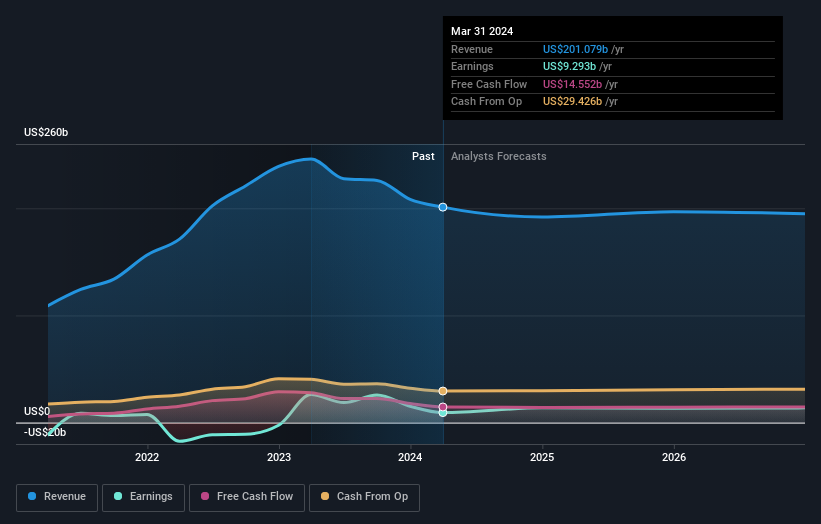- United Kingdom
- /
- Oil and Gas
- /
- LSE:BP.
BP p.l.c. Earnings Missed Analyst Estimates: Here's What Analysts Are Forecasting Now

BP p.l.c. (LON:BP.) missed earnings with its latest quarterly results, disappointing overly-optimistic forecasters. It looks like quite a negative result overall, with both revenues and earnings falling well short of analyst predictions. Revenues of US$49b missed by 14%, and statutory earnings per share of US$0.13 fell short of forecasts by 24%. The analysts typically update their forecasts at each earnings report, and we can judge from their estimates whether their view of the company has changed or if there are any new concerns to be aware of. So we gathered the latest post-earnings forecasts to see what estimates suggest is in store for next year.
View our latest analysis for BP

Following the recent earnings report, the consensus from 16 analysts covering BP is for revenues of US$191.9b in 2024. This implies a discernible 4.6% decline in revenue compared to the last 12 months. Per-share earnings are expected to shoot up 46% to US$0.83. Before this earnings report, the analysts had been forecasting revenues of US$211.4b and earnings per share (EPS) of US$0.84 in 2024. The consensus seems maybe a little more pessimistic, trimming their revenue forecasts after the latest results even though there was no change to its EPS estimates.
The consensus has reconfirmed its price target of UK£6.10, showing that the analysts don't expect weaker revenue expectations next year to have a material impact on BP's market value. There's another way to think about price targets though, and that's to look at the range of price targets put forward by analysts, because a wide range of estimates could suggest a diverse view on possible outcomes for the business. Currently, the most bullish analyst values BP at UK£10.04 per share, while the most bearish prices it at UK£5.02. This is a fairly broad spread of estimates, suggesting that analysts are forecasting a wide range of possible outcomes for the business.
Looking at the bigger picture now, one of the ways we can make sense of these forecasts is to see how they measure up against both past performance and industry growth estimates. One more thing stood out to us about these estimates, and it's the idea that BP's decline is expected to accelerate, with revenues forecast to fall at an annualised rate of 6.1% to the end of 2024. This tops off a historical decline of 1.7% a year over the past five years. Compare this against analyst estimates for companies in the broader industry, which suggest that revenues (in aggregate) are expected to decline 0.6% annually. So it's pretty clear that BP revenue is expected to decline at a faster rate than the wider industry.
The Bottom Line
The most important thing to take away is that there's been no major change in sentiment, with the analysts reconfirming that the business is performing in line with their previous earnings per share estimates. Unfortunately they also downgraded their revenue estimates, and our analysts estimates suggest that BP is still expected to perform worse than the wider industry. Yet - earnings are more important to the intrinsic value of the business. There was no real change to the consensus price target, suggesting that the intrinsic value of the business has not undergone any major changes with the latest estimates.
With that in mind, we wouldn't be too quick to come to a conclusion on BP. Long-term earnings power is much more important than next year's profits. We have forecasts for BP going out to 2026, and you can see them free on our platform here.
And what about risks? Every company has them, and we've spotted 2 warning signs for BP you should know about.
Valuation is complex, but we're here to simplify it.
Discover if BP might be undervalued or overvalued with our detailed analysis, featuring fair value estimates, potential risks, dividends, insider trades, and its financial condition.
Access Free AnalysisHave feedback on this article? Concerned about the content? Get in touch with us directly. Alternatively, email editorial-team (at) simplywallst.com.
This article by Simply Wall St is general in nature. We provide commentary based on historical data and analyst forecasts only using an unbiased methodology and our articles are not intended to be financial advice. It does not constitute a recommendation to buy or sell any stock, and does not take account of your objectives, or your financial situation. We aim to bring you long-term focused analysis driven by fundamental data. Note that our analysis may not factor in the latest price-sensitive company announcements or qualitative material. Simply Wall St has no position in any stocks mentioned.
About LSE:BP.
Undervalued with adequate balance sheet.
Similar Companies
Market Insights
Community Narratives


